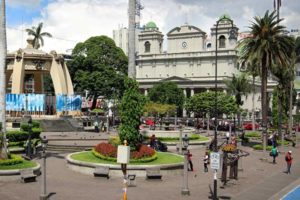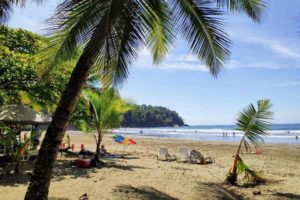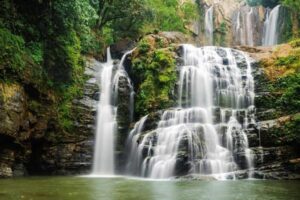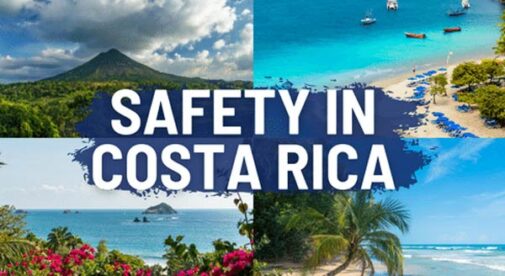One of the most important things to research when choosing to vacation or live overseas is safety. Costa Rica is ranked 38th in the 2022 Global Peace Index, out of 163 countries, and takes the top stop in Latin America. This ranking is based on factors like terrorism, threat to the ecology, access to guns, mass shootings, human rights, relations with neighboring countries, a well-functioning government, etc. Although Costa Rica is considered a very peaceful place, there are still some things you should be aware of.
Are you interested in retiring abroad? Yes | Not Sure Yet
Is It Safe to Live Costa Rica – Expat Safety
International Living writes about places that are considered safe for living or visiting. Many towns and regions we cover have large expat communities. Expats and locals work vigilantly to keep their neighborhoods safe. There are a number of Facebook and Whatsapp crime watch groups and even community apps that alert members to any criminal activity in the area. Chances are you are not going to hear about violent crime in the idyllic beach towns dotting the coasts or the quiet villages and farms perched in the mountains of the Central Valley. But crime does happen in Costa Rica, like nearly every country in the world.
Petty Crime in Costa Rica
Petty crime has long been an issue—especially in popular beach town areas and larger cities. For example, purse snatching off the back of a restaurant chair has been known to happen. A cell phone left on your table when you pop into the bathroom is also at risk of disappearing. Always keep an eye on your belongings. Keep your purse on your lap or use a fanny pack and gentlemen, place your phone/wallet in your front pocket. Always have someone looking after your items at the beach or waterfalls while swimming. And, of course, never flash large amounts of money or wear expensive jewelry. It just makes you a potential target.
Sometimes we drop our guard when on vacation in a place that feels so comfortable and friendly. But when common sense is used, occurrences like this are easily avoided.

Get Your Free Costa Rica Report Here:
Learn more about Costa Rica and other countries in our daily postcard e-letter. Simply enter your email address below and we'll send you a FREE REPORT – Costa Rica: The Land of Pura Vida
This special guide covers real estate, retirement and more in Costa Rica and is yours free when you sign up for our IL postcards below.
Home Invasions in Costa Rica
Since COVID-19, Costa Rica has experienced a greater wealth disparity and increasing unemployment. Due to these circumstances, some higher-end and middle-class neighborhoods have experienced an occasional home invasion. The security experts recommend electronic security systems, cameras, bars on the first-floor windows, and/or guard dogs. Gated communities also offer a layer of security. This is not to say it is commonplace, but you do need to consider safety when purchasing or renting a home, especially if it is somewhat isolated.
Keeping your Money Safe in Costa Rica
Carrying a passport, credit/debit cards, and money are part of international travel. Keeping them safe takes diligence. Be sure that wherever you are staying a lockable safe box is provided. They are typical in Costa Rican accommodations, but be sure to ask. Keep extra cash and your passport there—not with you. It is good to have a copy of your passport in your wallet or purse and photos of it and your tourist visa (the 90-day stamp you receive from immigration at the airport) on your phone.
It is also good to have the phone number of your bank or credit card company in a safe place in case your card is lost or stolen.
Don’t withdraw money at an ATM at night if you can help it. During the opening hours of the bank, there is usually a guard on site for security. Don’t carry large amounts of money with you at any given time. Credit and debit cards are widely accepted, especially in tourist areas.
Also watch out for investment scams. Although uncommon, if someone invites you to invest in something—a business, real estate, etc. and it sounds too good to be true, it probably is. Always consult a vetted local lawyer or accountant before committing to making any large purchases.

Transportation in Costa Rica
Traveling around Costa Rica is considered safe—whether in a car, bus, taxi, or even on foot. Although, it is not recommended to travel after dark by car (unless it is a short distance and you are familiar with the route).
Regarding taxis, be sure you are in a licensed taxi with a meter. Some of the smaller towns do not have metered cabs, so be sure to negotiate the price upfront. If the driver makes you uncomfortable in any way, take a different cab. Uber is becoming a viable alternative. They have been operating in San Jose for many years, but are now expanding to many other towns. This mode of transport is always considered safe, dependable, and affordable.
Buses run all day and into the night covering nearly every town in Costa Rica. They are safe and cheap. Just be aware of your surroundings and your items on board. If you are in a car and will be parked for sightseeing, etc., be sure all items within the car are hidden. It is recommended not to have any valuables in your parked car, if it can be avoided. A parked rental car with a suitcase is a huge signal to thieves who think they will hit the electronics jackpot and maybe a few passports too.
Automobile smash and grabs do happen in popular tourist areas or on city streets. We have a small Costa Rican flag (available at souvenir stores) hanging from our rear-view mirror and a Spanish newspaper on our dashboard. This signals to people we are “locals.”
Nightlife Safety in Costa Rica
My Costa Rican attorney always tells me, “Nothing good happens on the streets after midnight.” This is good advice for the late-night party crowd. The same rules you would use going out clubbing or partying in your hometown would apply to Costa Rica. Ladies (and men), never leave your drink unattended. You don’t know when someone might slip something into it.
If you order a mixed drink, ask for an international brand of liquor. A few years ago, there were some instances of alcohol poisoning with local brands of Costa Rican liquor called guaro. The name brands cost more, but it is worth it for your safety.
Solo Female Travel in Costa Rica
Lately, there has been an increase in female travelers and female digital nomads to Costa Rica. Of course, women should take heed of all of the points covered above, but there are also some things specific to women that need to be addressed. Besides being aware of your surroundings, avoiding places not well-lit at night, and keeping an eye on your drink.
Costa Rican men are very charming and friendly. But, don’t get swept away with the allure of a stranger while under the influence of alcohol until you get to know them better. Never let a stranger know where you live or are staying, and do not let them know initially that you are traveling alone.
Have a phone that works in Costa Rica; whether you have an international plan or a local sim card. Be sure to have a phone number of a trusted local person—your hotel manager, a local Airbnb host, your neighbor, your realtor—someone you can call if you need help in an emergency. If you are walking from a club late at night, be sure you are accompanied by someone you know and trust.

Get Your Free Costa Rica Report Here:
Learn more about Costa Rica and other countries in our daily postcard e-letter. Simply enter your email address below and we'll send you a FREE REPORT – Costa Rica: The Land of Pura Vida
This special guide covers real estate, retirement and more in Costa Rica and is yours free when you sign up for our IL postcards below.
Expat communities in Costa Rica host numerous events, from music to art classes, sports, volunteer opportunities, etc. Therefore, you can find many opportunities to meet other solo travelers. The best way to research events is to join a local Facebook group. You don’t have to dine alone either. Look for cooking classes to take or foodie tours to enjoy a dining community.
Be sure to route your map before you embark on an adventure by foot, bike, or in a rental car. People who look confused can be an easy target for someone unsavory.

Recreational Drugs in Costa Rica
The laws surrounding marijuana in Costa Rica are complicated, contested, and ever-changing.
Regarding recreational use, a court determined in 2018 that if a person grows cannabis in their homes, without it being used for trafficking or sales, it is permitted and is not a danger to public health. It needs to be grown and consumed in your home or on your private property. If you take it onto the streets you could find yourself in trouble with the law (although this is extremely rare). That being said, you will find marijuana sold almost everywhere in the country. If you want to partake, it is best to check in with a trusted local first, not some random seller on the beach, to make sure you are getting a good quality product. There is no refund policy!
You can also find hard drugs such as cocaine, heroin, molly, etc. We recommend it is best to stay away from purchasing any illegal drugs. Not only for the health aspect but, trust me, one does not want to spend time in a Costa Rican jail and pay hefty fines, or be deported and prohibited to return to Costa Rica for any length of time.
Prostitution in Costa Rica
Prostitution is the world’s oldest profession and is legal in Costa Rica. However, many of the activities surrounding it are illegal. The law forbids promoting or facilitating the prostitution of another. Therefore pimping, brothels, or prostitution rings are illegal. Prostitution is practiced openly throughout the country, particularly in popular tourism destinations like Jacó, Playas del Coco, Tamarindo, and San José.
The government has enacted a voluntary registration for prostitutes. Those who register with the CCSS (healthcare system) carry an ID card and are entitled to a free health check every 15 days. Registration also allows them to receive support and assistance—making the profession safer for both workers and clients.
As mentioned with drugs, if you are going to partake, it is best to check in with a local or regular client for references or be sure the worker has a health ID card.
Swimming in Costa Rica
With nearly 800 miles of coastline, Costa Rica boasts over 300 beaches. Some are good for surfing; others have smaller waves and are family friendly, and even some are good for snorkeling. However, it is good to exercise caution if you are not familiar with the waters. Very few beaches in Costa Rica have lifeguards. It is beneficial to you to check with locals or others at the beach to understand the water conditions. Costa Rican waters are known for rip tides and can be a challenge for even the strongest swimmers.
It is best to try to keep your feet on the surface as much as possible if swimming in rough water. The experts share these tips if you do encounter a riptide:
- Don’t Panic (easier said than done).
- Do not try to swim back to shore if you get caught in a riptide.
- Try to regain your footing, if possible, but don’t struggle with it, if you can’t.
- Lie on your back and float, pushing your hips and face out of the water.
- Expect to be pulled away from shore as much as 200 yards. A riptide will not drag you under water, but away from the shore.
- When the current weakens you will be able to swim parallel to the shoreline and then into shore once outside of the riptide.
It can happen anywhere, but the particular beaches most commonly known for riptides include:
- Playa Espadilla at Manuel Antonio
- Jacó Beach
- Dominical Beach
- Playa Hermosa near Jacó
- Playa Herradura on the Pacific Coast
Swimming in rivers also requires a bit of caution due to the possibility of freshwater crocodiles, and venomous snakes (although rare). Be sure to check with the locals or a guide before jumping in.
Remember, most swimming accidents occur due to unfamiliar territory or intoxication.

Areas to Avoid in Costa Rica
In the neighborhoods like los Cuadros de Goicochea near San José, El Infiernillo in Alajuela, or la Cieneguita in Limón province, there are some quasi gangs. Their activities are mostly centered around territorial disputes within their own neighborhoods, and the sale of drugs. You would most likely never consider visiting or living in these places, anyway.
But even in other towns that are considered “safe,” it is best to avoid certain places after dark—especially when alone. That would include dark alleyways, any of the beaches or parks late at night, and places where you see drugs exchanging hands.
Drinking Tap Water in Costa Rica
Costa Rica is one of the few Latin American countries with tap water that is considered safe to drink from the tap without a filter. However, many expats use some sort of filtration system or purchase large refillable water dispensers. It is recommended for anyone who has a delicate digestive system or after a recent storm/area flooding to err on the side of caution. Bottled water is readily available all over the country.
By implementing a few practical precautions, your time in Costa Rica should be safe, peaceful, and carefree.

Get Your Free Costa Rica Report Here:
Learn more about Costa Rica and other countries in our daily postcard e-letter. Simply enter your email address below and we'll send you a FREE REPORT – Costa Rica: The Land of Pura Vida
This special guide covers real estate, retirement and more in Costa Rica and is yours free when you sign up for our IL postcards below.
Related Articles
Costa Rica Facts to Tell Your Friends
Maps of Costa Rica: Best Beachside and Mountain Towns
Best Places to Live in Costa Rica: Five Top Expat Havens
Upcoming Conferences
The Only 2024 Fast Track Panama Conference
If your dream retirement involves stunning beaches… lush green mountains… a warm climate with no hurricanes… first-rate healthcare… incredible value for money (a couple can live well on $2,200 a month)… and the World’s #1 Retiree Discount Program…
Join our Panama experts and expats in February and discover why Panama could be your perfect paradise.
REGISTER NOW, SEATS LIMITED: EARLY BIRD DISCOUNT HERE


.png)